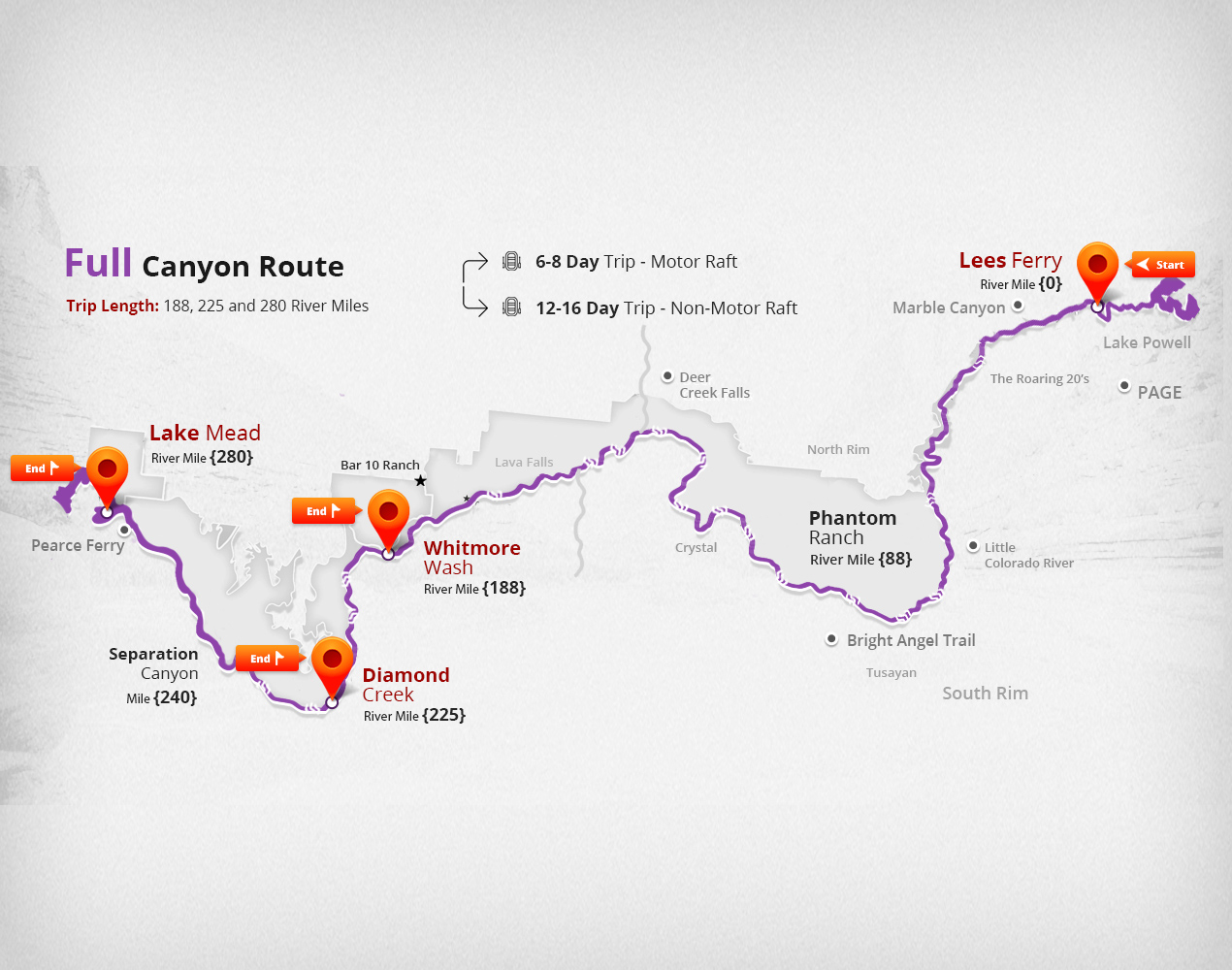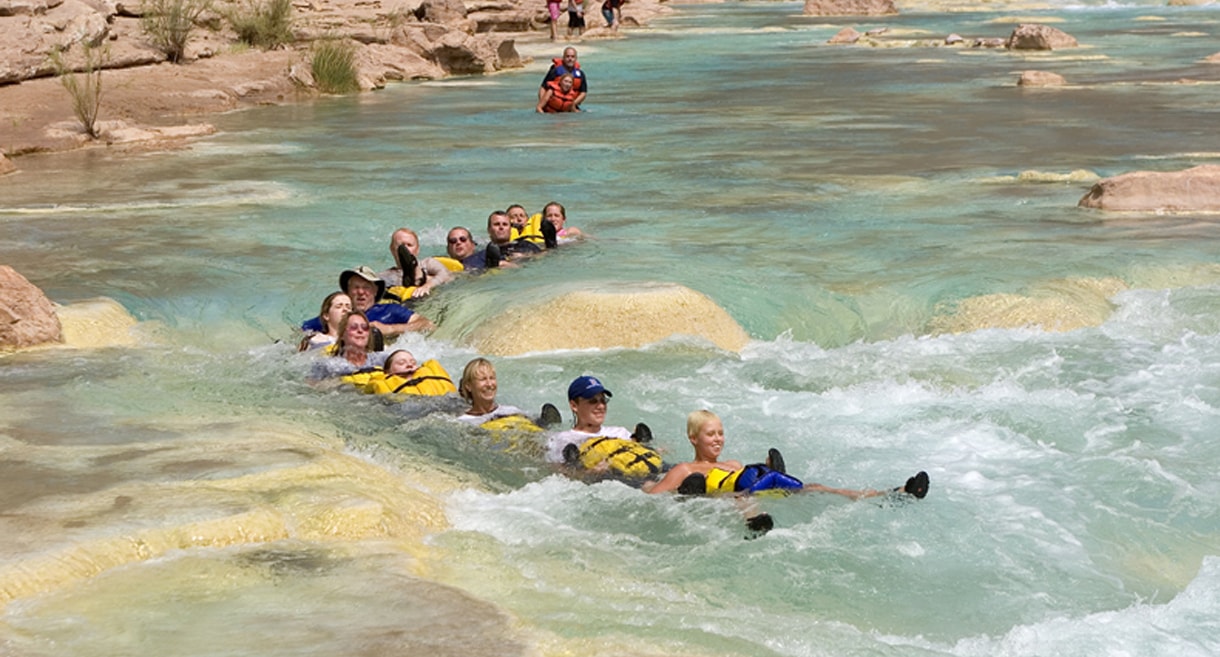What River Rafting Boats Can You Choose From?
Rafting outfitters in Grand Canyon National Park offer rafting trips on both motorized and non-motorized rafts. Which raft you select will depend on your day/time availability and how much of the Grand Canyon you're aiming to experience. See below for a comprehensive breakdown of the 5 raft types used on full Grand Canyon river trips.
Motorized Raft
Motorized rafts are the most popular style of raft offered by Grand Canyon rafting outfitters. Motorized rafts are powered by an ultra-quiet motor and require no assistance from passengers for paddling or steering. This feature makes motorized rafting a great option for families with young children, inexperienced rafters, or individuals who find paddling too physically taxing. Furthermore, motorized rafts are much larger than oar-powered rafts (a motorized raft is usually around 35 feet long), giving them more stability while moving through the water. This is an added comfort, especially for first-time rafters or passengers who are nervous about swimming.
If you're on a tight schedule and want to see as much of the Grand Canyon National Park as possible, a motorized rafting adventure is an excellent option. A motorized raft will cover more river miles per day and can transport you between major sites more quickly than a non-motorized raft. For instance, if you want to explore hidden caves, ancient Native American cultural sites, and enchanting waterfalls, a motorized Colorado River trip allows you to spend less time on the water and more time sightseeing.
While motorized rafts are very child friendly, most outfitters will enforce a minimum age requirement of 8 years.
Oar-Powered Raft
As the name suggests, an oar-powered raft is steered and powered by two long oars situated at the center of the raft. Oar rafts are much smaller than motorized rafts and will usually accommodate 6 passengers, including your river guide. Like a motorized raft, you will not be expected to paddle at any time. If interested, you may get the opportunity to try your hand at paddling when the raft is floating down calmer sections of the river, but this will be at your river guide's discretion and is not guaranteed.
An oar-powered raft is a fantastic option if you have the time to take a slow and leisurely journey through the Grand Canyon. Traveling at 3-4 mph, your speed will generally match that of the river current. This essentially doubles the time, in comparison to a motorized trip, it takes to travel from the Upper Canyon through to the Lower Canyon. The smaller size of an oar-powered raft will also give you a better feel for the twists, turns, and bumps of the Colorado River — in turn, this makes negotiating whitewater rapids an even more exhilarating experience!
The minimum age requirement for oar-powered rafting is between 10-12 years. Oar rafts are the second most popular option for rafting the Grand Canyon. As a result, you'll find that 12 out of our 15 outfitters offer oar-powered rafting trips.
Paddle Raft
Paddle rafting is what most people expect when they envisage their Grand Canyon rafting experience. A paddle raft holds 6-8 passengers, each of whom controls a small paddle to assist with steering and propelling their vessel. Because of the challenging physical demands of consistent paddling, we recommend that you have previous multi-day paddling experience under your belt before embarking on a Grand Canyon paddle raft trip.
Paddle rafts usually travel at the same sedate speed as the Colorado River’s current. This means you'll have more than enough time on the water to enjoy the towering vermilion walls of the Grand Canyon. Although the small size of paddle rafts allows for greater agility, it can also lead to a more tumultuous ride when traveling through rapids.
Paddle rafting is not recommended for children under 12 years of age (or for anyone who’ll find a multi-day paddling trip overly strenuous). Paddle rafting is only offered by 4 of the 15 outfitters operating along the Colorado River.
Hybrid Raft
Hybrid rafting simply refers to a combination of both oar and paddle rafts, with the passengers rotating between approximately 4 oar-powered rafts and 1 paddle raft each day. Hybrid rafting is a great option for people who want to try their hand at paddling but aren't yet ready to commit to a full Grand Canyon paddle raft trip. As you'll only be paddling every other day, you don't need a huge amount of prior rafting experience to participate in a hybrid Grand Canyon river trip. If you're not confident in your paddling abilities, your outfitter may be able to arrange for you to skip your turn in the paddle raft.
Hybrid rafting the Grand Canyon river is limited to 4 out of our 15 outfitters. Also, please note that no children under 12 years of age will be permitted on hybrid rafting trips.
Dory Raft
Unlike the previous rafting options, dory rafts are made from hardwood and, consequently, respond more quickly to rapids than an inflatable raft. Although slightly faster than oar-powered rafts, dory rafts are still much slower than a motorized vessel. This means you'll have plenty of time to enjoy the scenery of the Grand Canyon National Park during a dory raft trip.
No paddling is required when you take a dory raft down the Colorado River. In most cases, you'll share your vessel with 5 other people, and, like an oar-powered raft, your river guide will steer from the center of the boat. Dory rafts often accompany oar-powered rafts during full Grand Canyon trips to give passengers the chance to experience the river on a different type of rafting vessel. However, the inclusion of a dory raft in an oar-powered rafting expedition is not guaranteed and will depend on your outfitter. When booking your trip, please keep in mind that only 5 out of the Grand Canyon's 15 outfitters currently support dory raft trips.
Children aged 10 and above are permitted to travel in a dory raft.
What to Expect From a Full Grand Canyon River Trip?
A full Grand Canyon trip covers both the upper and lower sections of the Grand Canyon and is the best way to see everything the Grand Canyon National Park has to offer. Shortly after you depart Lees Ferry, you'll enter the Roaring 20s, a well-known rapids system that contains some of the Colorado River's most formidable rapids. This will be your first real experience with Class V rapids in the Colorado River. Fortunately, you'll have ample opportunity to enjoy lots more whitewater rafting during a full Grand Canyon trip. If fierce whitewater river rafting isn't enough, there are dozens of other highlights you can look forward to, from the turquoise blue waters at the confluence of the Little Colorado River to the towering canyon systems of Elves Chasm and Redwall Cavern. If you have any questions during your trip, your river guides are full of knowledge and always happy to share what they know about the ecology, geology, and history of the Grand Canyon.
All food and camping equipment is included in the cost of your trip, leaving you with one less thing to worry about when planning your adventure. While you choose a spot to set up your camping gear, your river guides will be busy cooking you a delicious dinner. After dinner, you and your raft mates can settle in with a warm drink and take in the awe-inspiring night sky. The following morning, you'll wake up to a hot breakfast, fresh coffee, and an impeccable Grand Canyon sunrise.
On the last day of your trip, you will be transported out of the Grand Canyon from one of the three take-out points listed above. Where you end your trip will depend on your outfitter. Regardless of your take-out point, your return transportation will take you to either Page, Las Vegas, or back to your starting location. The latter option presents an excellent opportunity to extend your trip and explore some of the Grand Canyon National Park's other attractions. The National Park Service maintains a wide range of tourist facilities along both the North and South Rim ?— popular attractions include the Grand Canyon Skywalk, the Canyon Vistas Mule Ride, and the rim-to-rim hiking trail.
Full Grand Canyon Rafting Trip Outfitters
The Grand Canyon National Park Service provides a comprehensive list of reliable outfitters for full Grand Canyon rafting trips, each with varying itineraries and trip lengths.
If you're considering a rafting expedition in the Grand Canyon, Advantage Grand Canyon is the best place to go for advice on outfitters, route selection, raft type, and trip duration. We offer trips from all of the 15 top outfitters so you may shop them all and get the best trip for the best price RIGHT HERE! Our free and easy-to-use trip planner makes it easy to understand and compare the vast range of trip options.







